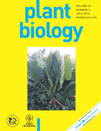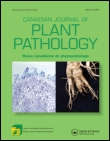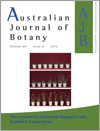
Annual Review of Phytopathology
metrics 2024
Advancing knowledge in plant health.
Introduction
Annual Review of Phytopathology, published by ANNUAL REVIEWS, is an esteemed journal that has been at the forefront of the field since its inception in 1973. With a focus on both Plant Science and Medicine, the journal holds a prestigious Q1 ranking in both categories for 2023, reflecting its influence and significance in the academic community. The journal features comprehensive review articles that encapsulate significant advancements and emerging trends in phytopathology, providing valuable insights for researchers, professionals, and students alike. Its rigorous peer-review process ensures the highest quality of publication, making it essential for anyone seeking to stay informed on critical issues affecting plant health and related disciplines. With an impressive Scopus ranking of #10 out of 516 in Agricultural and Biological Sciences, Annual Review of Phytopathology remains a vital resource for the dissemination of cutting-edge knowledge, fostering innovation and collaboration within the field.
Metrics 2024
 2.76
2.76 9.10
9.10 12.30
12.30 184
184Metrics History
Rank 2024
Scopus
IF (Web Of Science)
JCI (Web Of Science)
Quartile History
Similar Journals

Plants-Basel
Leading the way in innovative plant research.Plants-Basel is a distinguished open access journal published by MDPI since 2012, offering a comprehensive platform for researchers and professionals in the field of ecology, plant science, and evolutionary biology. Based in Switzerland, this journal has established itself as a leader in disseminating high-quality research, evident through its impressive rankings in multiple categories, including Q1 in Ecology and Plant Science for 2023. With a substantial impact factor and a dedicated focus on advancing our understanding of plant interactions, ecosystems, and sustainable practices, Plants-Basel is vital for scholars seeking to contribute to these critical fields. The journal's commitment to open access enhances visibility and accessibility, facilitating the widespread sharing of knowledge essential for addressing contemporary ecological challenges.

JOURNAL OF PLANT PATHOLOGY
Uncovering the Secrets of Plant DiseasesJOURNAL OF PLANT PATHOLOGY, published by SPRINGER, is a premier academic journal dedicated to advancing the understanding of phytopathology and related fields. With a strong international presence and an impact factor that reflects its influence in the scientific community, this journal offers essential insights to researchers, professionals, and students engaged in plant health. Since its inception in 1997, it has consistently provided a platform for innovative research, contributing to the Q2 rank in Plant Science as per the 2023 category quartiles. The journal covers a broad spectrum of topics related to plant diseases, their management, and the ecological impacts they pose, ensuring relevance to contemporary challenges in agriculture and sustainability. While the journal does not currently offer Open Access options, it remains a crucial resource for those looking to deepen their knowledge and bolster their research endeavors in the vital area of plant pathology.

EUROPEAN JOURNAL OF PLANT PATHOLOGY
Cultivating knowledge for a healthier future in horticulture.The EUROPEAN JOURNAL OF PLANT PATHOLOGY, published by SPRINGER, is a leading academic journal dedicated to advancing the understanding of plant pathology within the fields of Agronomy, Horticulture, and Plant Science. With an ISSN of 0929-1873 and an E-ISSN of 1573-8469, this journal has established its presence since its inception in 1994 and continues to serve as an essential resource for researchers, professionals, and students through 2024. The journal is ranked in the Q2 category in multiple scholarly domains and boasts impressive Scopus rankings, placing it in the 80th percentile for Horticulture and 69th percentile for Plant Science. Notably, it facilitates the dissemination of cutting-edge research and reviews that address critical challenges in plant health, disease management, and sustainable agricultural practices. Although the journal is not Open Access, it provides vital insights and contributes significantly to the scientific community, fostering collaboration and innovation in plant pathology.

Phytobiomes Journal
Fostering global collaboration in plant science and ecology.Phytobiomes Journal, published by the American Phytopathological Society, is a leading open access journal that has been at the forefront of phytobiome research since its inception in 2017. With its robust impact factor reflected in its high rankings across multiple fields—achieving Q1 status in Agronomy and Crop Science, Ecology, Ecology, Evolution, Behavior and Systematics, and Plant Science—the journal stands out in presenting cutting-edge research that integrates biological disciplines to enhance understanding of plant health and productivity. The journal’s open access model ensures that research findings are accessible to a global audience, fostering collaboration and innovation in the fields of plant science, ecology, and phytopathology. With its strategic location in the United States and a commitment to publishing high-quality, peer-reviewed content, Phytobiomes Journal plays a pivotal role in advancing knowledge and practices that address the challenges in sustainable agriculture and environmental stewardship.

PLANT BIOLOGY
Cultivating Knowledge in Ecology and EvolutionPLANT BIOLOGY is a prestigious academic journal published by Wiley, dedicated to advancing knowledge in the fields of plant science, ecology, and evolutionary biology. With an impressive impact factor and ranking in the Q1 category for Ecology, Evolution, Behavior and Systematics, and Plant Science as of 2023, it stands at the forefront of research dissemination. The journal encompasses a broad scope of plant biology topics, providing a critical platform for researchers to share innovative findings and foster interdisciplinary collaboration. Available in both print (ISSN: 1435-8603) and online formats (E-ISSN: 1438-8677), it ensures accessibility through open access options. As a crucial resource for professionals, researchers, and students alike, PLANT BIOLOGY cultivates a deeper understanding of plant systems and their ecological significance, making it an essential addition to the library of anyone dedicated to the study of biology and the environment.

AUSTRALASIAN PLANT PATHOLOGY
Advancing the science of plant health in Australasia.Australasian Plant Pathology, published by Springer, is a leading journal in the field of plant science that focuses on the study of plant diseases and their management across the Australasian region. With an established history since 1978, the journal aims to provide a platform for high-quality research that enhances our understanding of plant pathology, prevention strategies, and sustainable management practices. With an impact factor that reflects its significance in the scientific community and its Q3 quartile ranking in 2023 among plant science journals, it serves as a vital resource for researchers, professionals, and students alike. Although it does not have Open Access options, the journal ensures that its content, which spans a wide spectrum of plant pathology topics, remains accessible to a diverse audience globally. With a commitment to advancing knowledge in this crucial area of study, Australasian Plant Pathology continues to play an essential role in addressing the challenges posed by plant diseases in a changing environment.

MYCORRHIZA
Unveiling the Secrets of Mycorrhizal NetworksMYCORRHIZA is a prestigious journal dedicated to the exploration of mycorrhizal symbiosis and its implications across various biological disciplines. Published by SPRINGER, this journal serves as a crucial platform for researchers and professionals in the fields of ecology, plant science, and molecular biology. With an impressive impact factor reflected in its 2023 quartile rankings—ranking Q1 in both Ecology, Evolution, Behavior and Systematics and Plant Science, as well as Q2 in Genetics and Molecular Biology—MYCORRHIZA plays a significant role in disseminating groundbreaking findings that advance our understanding of plant interactions and ecosystem dynamics. The journal has been active since 1991 and continues to publish cutting-edge research through 2024, ensuring that its audience remains at the forefront of scientific innovation. For additional information about publication protocols and submission guidelines, please refer to the journal's website.

CANADIAN JOURNAL OF PLANT PATHOLOGY
Unraveling the complexities of plant diseases for agricultural advancement.Canadian Journal of Plant Pathology, published by Taylor & Francis Inc, is a leading academic journal dedicated to advancing the field of plant pathology, with a significant focus on the interplay between plant health and environmental factors. Established in 1979, this journal has established a reputation for high-quality research, currently holding a commendable impact factor within its category. As of 2023, it ranks in the Q2 quartile for both Agronomy and Crop Science as well as Plant Science, highlighting its importance and influence in these domains. With an impressive ranking of 142/516 in Plant Science and 115/406 in Agronomy and Crop Science according to Scopus, the journal is positioned within the 72nd and 71st percentiles, respectively. The Canadian Journal of Plant Pathology serves as a vital platform for researchers, professionals, and students aiming to contribute to the understanding of plant diseases, fostering innovation and development in agricultural practices.

PHYTOPATHOLOGIA MEDITERRANEA
Exploring the forefront of agronomy and plant science.PHYTOPATHOLOGIA MEDITERRANEA is a premier open access journal published by the Mediterranean Phytopathological Union, dedicated to advancing knowledge in the fields of Agronomy, Crop Science, Horticulture, and Plant Science. With its Q1 status in Agronomy and Crop Science and Horticulture and a strong ranking in Plant Science, this journal is recognized for its significant contribution to research, featuring high-quality studies and reviews that address contemporary challenges in plant health and disease management. As an essential resource for researchers, professionals, and students, PHYTOPATHOLOGIA MEDITERRANEA facilitates the dissemination of cutting-edge research and serves as a critical hub for academic discourse in the Mediterranean region and beyond. Since embracing open access in 2014, the journal has further enhanced its visibility and accessibility, providing a valuable platform for innovative ideas and collaborative research in the vital domain of plant pathology. The journal is indexed in Scopus with impressive rankings, including the 20th percentile in Horticulture, which underscores its esteemed position within the academic community, making it an indispensable source for anyone looking to stay abreast of developments in the field.

AUSTRALIAN JOURNAL OF BOTANY
Advancing plant sciences for a sustainable future.The Australian Journal of Botany is a prestigious peer-reviewed journal published by CSIRO PUBLISHING, dedicated to advancing the field of plant sciences and ecology. Established in 1953, this journal provides a critical platform for researchers to share original research findings, reviews, and perspectives in subjects ranging from plant biology to ecological interactions, with a focus on Australian flora and its conservation. With an impressive impact factor and categorized in the Q3 quartile in both Ecology, Evolution, Behavior and Systematics and Plant Science, the journal ranks competitively within its fields, allowing authors to reach a diverse audience of professionals, students, and fellow researchers. The journal is accessible in print and electronically through its ISSN: 0067-1924 and E-ISSN: 1444-9862, providing wider access to vital research outcomes that influence environmental policies and natural resource management. As it aspires towards innovation and excellence, the Australian Journal of Botany remains an essential resource for those passionate about the richness of plant biodiversity and ecological understanding.